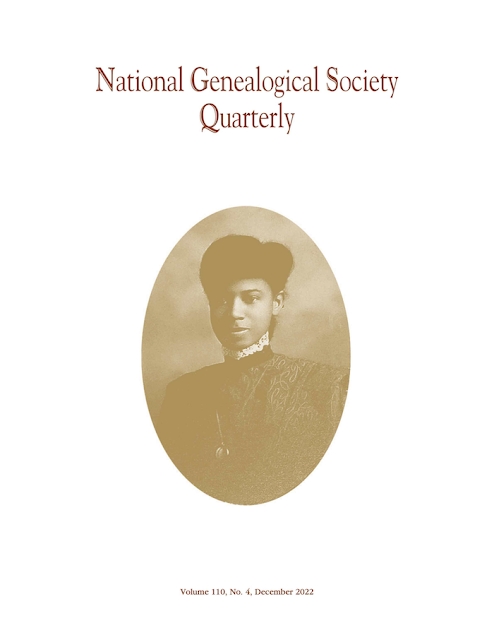The January–March 2023 Issue
of the NGS Magazine is Now Online
The January–March 2023 issue of NGS Magazine, Volume 48, Number 4, is being printed and is now available online in the Members Only section of the website. Delivery of print copies depends upon USPS schedules. This issue’s theme is the Mid-Atlantic Region.
EDITOR'S NOTE by Deb Cyprych
In celebration of the National Genealogical Society 2023 Family History Conference in Richmond, Virginia, this issue features articles about unique genealogical aspects of the Mid-Atlantic region. The area includes Delaware, the District of Columbia, Maryland, New Jersey, New York, Pennsylvania, Virginia, and West Virginia.
Genealogists with ancestry in Virginia and nearby states can combine attending the conference, sightseeing, and research in one trip. Online preparation will maximize the effectiveness of in-person research time while visiting repositories. Roccie Hill provides information about using online catalogs, finding aids, guides, abstracts, and indexes to find the locations of offline documents in libraries, historical and genealogical societies, and courthouses in Virginia.
The Library of Congress in Washington, DC, is just one hundred miles from Richmond. Candice Buchanan and Karen Walfall present a researcher’s guide to the catalog and collections of the largest library in the world, highlighting the genealogical resources in the Local History and Genealogy Section, reading rooms dedicated to other subjects, digital collections, and assistance available from librarians.
All seven states in the Mid-Atlantic region use irregular metes and bounds boundary descriptions in land records. Drawing plats based on these descriptions can enhance genealogical research in a number of ways. Gerald Smith explains how surveyors measured metes and bounds descriptions, where existing plats may be recorded, and how researchers can create their own plats to solve genealogical problems, by hand or in software.
During Virginia’s long history of settlement, a variety of court systems has handled civil and criminal cases. Despite the loss of records for some courts, valuable genealogical information remains for many others. Kathy Petlewski offers a timeline of Virginia courts and suggestions for locating their records.
Local militia service may be the reason why men not known to have served in federal military units were known by military titles. William A. Veselik details a case study about a Virginia militiaman, discusses the history of militias in the United States, and summarizes the sources of militia records.
In other articles and columns, Claire Kluskens explores unusual federal records digitized by the National Archives; Paul Woodbury makes recommendations for analyzing shared matches in DNA research; Carla Cegielski demonstrates how software can make the process of transcription easier and more enjoyable; and Cheri Hudson Passey outlines the array of resources available to member organizations on the NGS website.
TABLE OF CONTENTS
Features
- NGS 2023 Family History Conference: Virginia is for Family History Lovers by Mary O’Brien Vidlak, CG
- Online Preparation for a Research Trip to Virginia by Roccie Hill, MA
- Metes and Bounds Land Plats Can Solve Genealogical Problems by Gerald Smith, CG
- Library of Congress: Marvelous Resources, Open to All by Candice Buchanan, CG, and Karen Walfall
- Tracing Military Service in State Militia Records by William A. “Bill” Veselik
- Unusual Federal Census Records by Claire Kluskens
Departments
- PRESIDENT'S MESSAGE by Kathryn M. Doyle
- EDITOR'S NOTE by Deb Cyprych
- NGS NEWS
- Earn a Certificate in NGS’s New Institute-Level Online Course: Advanced Skills in Genealogy by Terry Koch-Bostic
- REFERENCE DESK
- Researching Virginia’s Early Court Records by Kathy Petlewski, MSLS
- SOCIETY FORUM
- Using the NGS Society and Organization Resources Web Page by Cheri Hudson Passey
- DNA DISCOVERY
- Working with Shared Matches by Paul Woodbury
- TECH TIPS
- Tools to Make Transcribing Easier by Carla S. Cegielski
NGS Magazine is published quarterly to update members of the National Genealogical Society on NGS activities and to provide genealogists with special information and guidance on conducting effective genealogical research. The magazine is sent to libraries by subscription. Online access to NGS Magazine is available only as long as membership is active.


